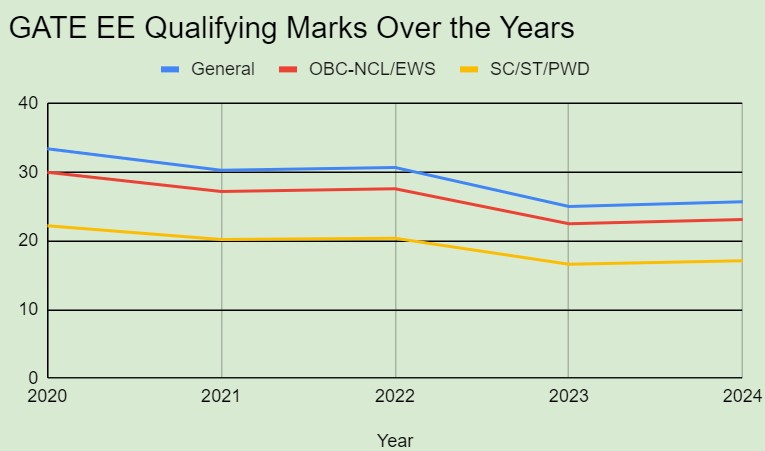GATE EE Previous Year Cut-off: The Indian Institute of Technology Roorkee (IITR) has released the notification for the GATE 2025 exam on its official website. The Graduate Aptitude Test in Engineering (GATE) is one of the most competitive exams in India for engineering graduates, enabling them to pursue postgraduate studies or secure lucrative job opportunities in public sector undertakings (PSUs). All the aspirants are advised to check the GATE EE past year cut-off to estimate the probable score they need to secure to clear the exam.
The exam conducting authority releases the GATE exam cut-off after the announcement of results. The GATE EE previous year cut-off helps the aspirants to set a target score so that they can make a well-designed preparation strategy.
GATE Electrical Engineering Previous Year Cut-off
The GATE cutoff is the minimum score a candidate must obtain to qualify for further processes, such as admissions into postgraduate programs or securing jobs in PSUs. Remember, scoring well above the cutoff not only ensures qualification but also improves your chances of getting into top institutes or securing a job with a reputed PSU. There are three primary types of cutoffs for GATE:
- Qualifying Cutoff: This is the minimum score required to be declared GATE qualified. This score is different for each paper and varies according to the category of the candidate (General, OBC, SC/ST, etc.).
- Admission Cutoff: Institutes such as the Indian Institutes of Technology (IITs), Indian Institute of Science (IIScs) and National Institutes of Technology (NITs) set their own cutoffs for GATE EE, which determine the eligibility for admission into their postgraduate programs.
- PSU Cutoff: Public Sector Undertakings (PSUs) use GATE scores to shortlist candidates for jobs. Each PSU may have its own cutoff score based on the number of vacancies and the overall performance of candidates.
GATE EE Past Year Cut-off
The table provided below shows the GATE EE cutoff, let’s look at the cutoff scores over the past five years for different categories:
| Year | GATE Qualifying Marks | ||
| General | OBC-NCL/EWS | SC/ST/PWD | |
| 2024 | 25.7 | 23.1 | 17.1 |
| 2023 | 25 | 22.5 | 16.6 |
| 2022 | 30.7 | 27.6 | 20.4 |
| 2021 | 30.3 | 27.2 | 20.2 |
| 2020 | 33.4 | 30 | 22.2 |
GATE EE Previous Year Cut-off Trend Analysis
To understand the trends in the GATE EE cutoff, let’s look at the graph provided below. Understanding these trends can help candidates get a sense of what to aim for during their preparation.

After analysing the trends, the following conclusions can be drawn:
- The qualifying cutoff for the General category has ranged from around 25 to 33 over the past five years. This shows some fluctuation depending on the difficulty of the exam and other factors.
- OBC-NCL cutoffs tend to be approximately 10-11% lower than the General category cutoffs.
- SC/ST/PwD cutoffs are significantly lower, usually around 67% of the General category cutoffs.
Factors Determining GATE EE Cut-off
There are various factors responsible for determining the cut-off marks, some of them are as follows.
- Number of Test-Takers: The number of candidates appearing in the exam always affects the cut-off marks. The high number of candidates means high competition which increases the cut-off marks.
- Difficulty Level of Exam: The difficulty level of the exam is also a crucial factor that decides the cut-off marks. If the questions asked in the exam are difficult in nature, then the cut-off marks will definitely come down.
- Number of Seats Available: The number of vacancies is always inversely proportional to the cut-off mark. The lesser number of vacancies means a high cut-off and vice-versa.
Candidate’s performance: The overall performance of candidates also affects the cut-off marks. If a high number of candidates do well in the exam, then the cut-off marks will also be high.
Comments
All Comments (0)
Join the conversation